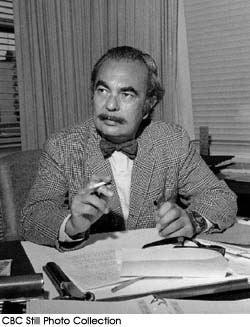
Year Born: 1917
Year Died: 1997
Pioneer
Newman, Sydney (1917-1997)
He was the Canadian behind those most British of TV series Dr. Who and The Avengers. Much more than that, he was one of the most influential figures in 20th Century television drama, a Canadian who transformed British television by moving it from being a medium for middlebrows to a medium for the masses.
He was born in Toronto, attended Ogden Public School, and studied commercial and fine arts at Central Technical School. He had a varied early career before he joined the National Film Board in 1941 as an assistant film editor. The following year he was editing and directing armed forces training films and information shorts about the war and from 1947 to 1952 he was executive producer for all Canadian government cinema films. During this time he was sent to study U.S. television techniques at NBC in New York for a year.
In 1952 he joined the CBC as director of features and outside broadcasts, then was named drama supervisor and producer of series like On Camera and General Motors Theatre. While with General Motors Theatre, he worked with contemporary dramatists. Britain had licensed independent television in 1955 and in 1959 he moved to England as head of the drama department at Britain’s ABC-TV, a regional ITV company supplying weekend drama. There he created Armchair Theatre, encouraging rising dramatists like Harold Pinter and Alun Owen to write about contemporary populist issues for TV. He and the Canadians who followed, including directors Ted Kotcheff and Alvin Rakoff, are recognized as having had a significant influence on British television drama.
In a 1979 interview, he explained: “I said we should have an original play policy with plays that were going to be about the very people who owned TV sets – which is really a working class audience.”
Dr. Who happened because ITV was moving up in the ratings against the BBC in 1962 and the BBC hired Newman from ITV as head of drama. The BBC was looking for a new show to stay ahead of ITV, science fiction was becoming popular, and Newman was assigned to create a science fiction series.
After several rejected concepts, Newman came up with an eccentric professor with a time-travel machine. It wasn’t expected to last more than several weeks; with more than 750 episodes over 26 years, it became the longest continuously running science fiction series on TV.
In 1968, Newman returned to film production with Associated British Pictures Corporation.
He returned to Canada in 1970 as acting director of the broadcast programs branch of the CRTC and later in 1970 was appointed government film commissioner and chairman of the National Film Board, a position he held until 1975. He also acted as a board member, director and advisor to the CBC, the Canadian Film Development Corporation, the CRTC and other bodies. In 1981 he started Sydney Newman Enterprises. Also in 1981 he was made an Officer of the Order of Canada. He was also was a Knight of Mark Twain, among many other honours.
Sydney Newman was the source of the title of former CBC news head Knowlton Nash’s book Cue The Elephant about life behind the scenes at the CBC. According to the book, Newman was producing an experimental live show from the Canadian National Exhibition in 1952 when he yelled at floor director Harry Rasky to “Cue the goddamned elephant”.
Sydney Newman died in October 1997.
Written by Jerry Fairbridge – August, 2002
